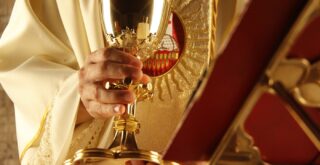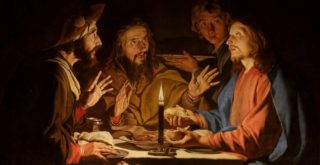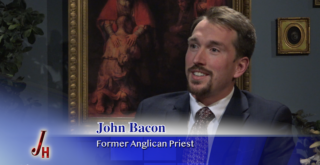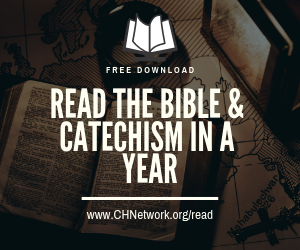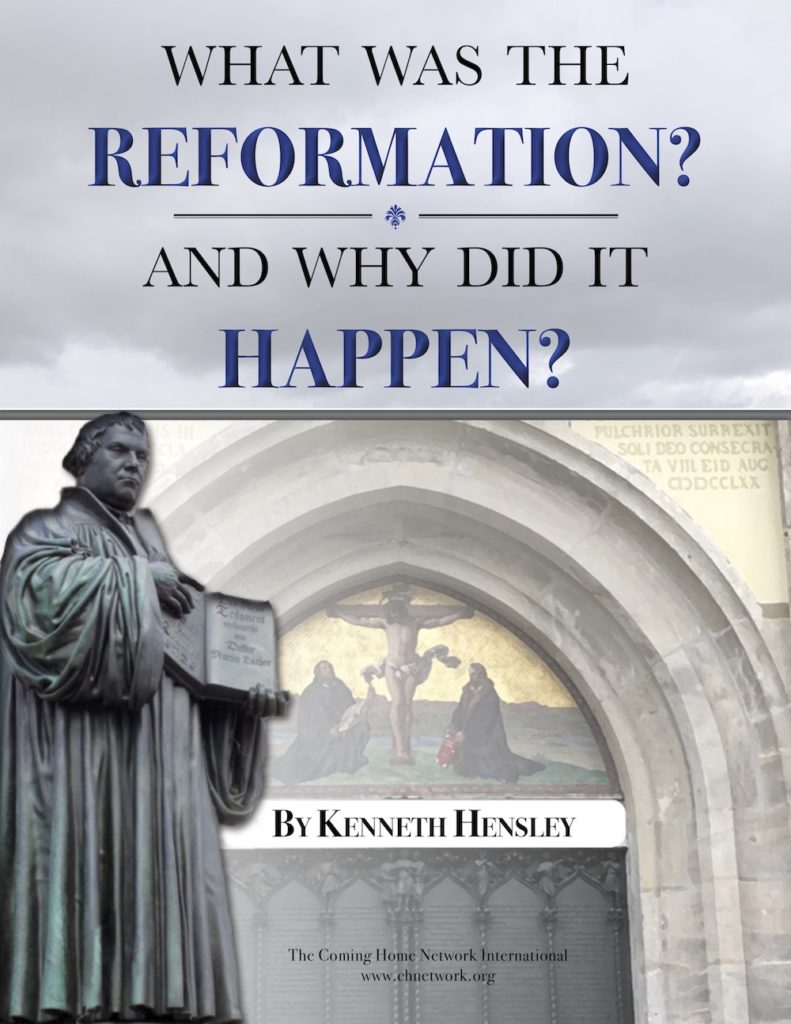
This is Part IV of a four-part series by Ken Hensley. Part I Part II Part III
It was hard for me to learn that the early Church did not teach, and did not practice, sola Scriptura.
At this point, I was deep into reading the early Church Fathers, and it seemed at times as though, with every passage I read, the foundation of my world view as a Protestant shifted a little bit more. Newman had said, “To be deep in history is to cease to be Protestant.” I was experiencing this in real time. The ground beneath my feet was moving. I was being taken to some new place.
Specifically, I had assumed my entire Christian life that the earliest Christians were like us Evangelical Protestants who looked to the “Bible alone.” The realization that they were not like us, that they did not look to the Bible alone, but to Scripture understood in terms of a Tradition conceived as passed down from the Apostles and preserved in the Church … well, this was a revelation to me.
It was hard for this Baptist minister to assimilate these things.
And yet I found quotations like the following, from Origen, throughout the Fathers:
The teaching of the Church has indeed been handed down through an order of succession from the Apostles, and remains in the churches even to the present time. That alone is to be believed as the truth, which is in no way at variance with ecclesiastical and apostolic tradition (Origen, Fundamental Doctrines, c. AD 225).
And then I ran into St. Vincent of Lerins, and I learned something new. I learned that, while the early Church may not have practiced sola Scriptura, the heretics did. In fact, according to St. Vincent’s description, the heretics of his time appear to have been expert in using the Bible alone to prove their positions.
“It is written!”
In the early fifth century, St. Vincent of Lerins wrote his Commonitorium (c. AD 434). Its purpose was to offer general guidance to Christians on how one might distinguish good orthodox Catholic teaching from the teaching of heretics.
Apparently, heretical teachers existed in Vincent’s day, and since they could not appeal to what Vincent calls “the universal and ancient faith of the Catholic Church” to substantiate their views (after all, it was from this faith that they sought to win converts), they focused on making their case from the Bible alone.
Vincent describes how adept these heretics were at using Scripture to prove the truth of their heretical doctrines.
And if one should ask one of the heretics … “How do you prove? What ground have you for saying that I ought to cast away the universal and ancient faith of the Catholic Church?” He has the answer ready, “For it is written.” And forthwith he produces a thousand examples, a thousand authorities from the law, from the psalms, from the apostles, from the prophets, by means of which, interpreted on a new and wrong principle, the unhappy soul may be precipitated from the height of Catholic truth to the lowest abyss of heresy …. Do heretics appeal to Scripture? They do indeed, and with a vengeance. For you may see them scamper through every single book of Holy Scripture … Whether among their own people or among strangers, in private or in public, in speaking or in writing, at convivial meetings or in the streets, hardly ever do they bring forward anything of their own which they do not endeavor to shelter under the words of Scripture … You will see an infinite heap of instances, hardly a single page, which does not bristle with plausible quotations from the New Testament or the Old. (Chapters 25 and 26)
I must admit that I found St. Vincent’s descriptive language here kind of funny. I thought I was reading Dr. Seuss for a moment (“Whether among their own people or among strangers, in private or in public, in speaking or in writing, at convivial meetings or in the streets”) and had to chuckle at the image of these heretics scampering through the Bible to find support for their false doctrines.
At the same time, I couldn’t help but think of those prophecy “experts” you see on TV, who can rattle off, from memory, passage after passage from Jeremiah and Ezekiel and Daniel and the Book of Revelation to support the most idiotic of beliefs.
I couldn’t deny that what Vincent said was true. Many years of experience teaching Scripture had convinced me that it is indeed possible to find “plausible quotations” from the Old and New Testaments to support virtually any and every doctrinal position that has ever been proposed.
Scripture and Tradition
So how to distinguish true teaching from false?
If the issue is not to be settled by who can bury whom under an “infinite heap of instances” from the Old and New Testaments plausibly interpreted, how is it to be settled?
Here’s the answer St. Vincent gives:
I have often then inquired earnestly and attentively of very many men eminent for sanctity and learning, how and by what sure and, so to speak, universal rule I may be able to distinguish the truth of Catholic faith from the falsehood of heretical depravity. I have always, and in almost every instance, received an answer to this effect: That whether I or any one else should wish to detect the frauds and avoid the snares of heretics as they arise, and to continue sound and complete in the Catholic faith, we must, the Lord helping, fortify our own belief in two ways; first, by the authority of the Divine Law, and then, by the Tradition of the Catholic Church.
Anticipating that some would respond, “But isn’t the Bible enough?” Vincent continues,
But here some one perhaps will ask, Since the canon of Scripture is complete, and sufficient of itself for everything, and more than sufficient, what need is there to join with it the authority of the Church’s interpretation? For this reason: because, owing to the depth of Holy Scripture, all do not accept it in one and the same sense, but one understands its words in one way, another in another; so that it seems to be capable of as many interpretations as there are interpreters. For Novatian expounds it one way, Sabellius another, Donatus another, Arius, Eunomius, Macedonius, another, Photinus, Apollinaris, Priscillian, another, Iovinian, Pelagius, Celestius, another, lastly, Nestorius another. Therefore, it is very necessary, on account of so great intricacies of such various errors, that the rule for the right understanding of the prophets and apostles should be framed in accordance with the standard of Ecclesiastical and Catholic interpretation.
In this passage, St. Vincent exposed the essential practical problem with the Protestant principle of sola Scriptura — a problem impossible to not see after 500 years of Protestant history, with Protestant churches having divided and split into hundreds and even thousands of separate denominations, sects, and independent movements.
Christians in Vincent’s time, standing firmly within Catholic tradition, could argue passages of Scripture. But heretics could argue passages of Scripture as well! And unless the Church Christ founded to be “one, holy, catholic and apostolic” wanted to simply fragment until there was a church for every sincerely held doctrinal viewpoint, there had to be some method for testing whose interpretation was right and whose was wrong.
Lessons
At this point, several things were becoming clear to me.
1. It was clear that St. Vincent’s essential approach to the issue of how Scripture and Tradition are to relate to one another was the same as that of early Church Fathers in general.
I took a moment to read once again some of the passages I had already looked at and was attempting (unsuccessfully) to assimilate into my Evangelical Protestant worldview.
Tertullian had insisted on the importance of apostolic succession in weeding out false teaching. There was absolutely no concern for this in my form of Evangelical Christianity.
Moreover, if there be any (heresies) bold enough to plant themselves in the midst of the apostolic age, so that they might seem to have been handed down by the Apostles because they were from the time of the Apostles, we can say to them: let them show the origins of their Churches, let them unroll the order of their bishops, running down in succession from the beginning, so that their first bishop shall have for author and predecessor some one of the Apostles or of the apostolic men who continued steadfast with the Apostles …. Then let all the heresies … offer their proof of how they deem themselves to be apostolic (Prescription Against Heresies 32, c. AD 200).
There were a number of other similar statements in the Fathers. But it was the words of St. Irenaeus, bishop of Lyons and the greatest biblical theologian of the second century, that best conveyed to me the mindset of the early Church on these matters — a mindset, again, so very different from what I had been trained to possess.
As I said before, the Church, having received this preaching and this faith, although she is disseminated throughout the whole world, yet guarded it, as if she occupied but one house. She likewise believes these things just as if she had but one soul and one and the same heart; and harmoniously she proclaims them and teaches them and hands them down, as if she possessed but one mouth. For, while the languages of the world are diverse, nevertheless, the authority of the Tradition is one and the same …. When, therefore, we have such proofs, it is not necessary to seek among others the truth, which is easily obtained from the Church. For the Apostles, like a rich man in a bank, deposited with her most copiously everything which pertains to the truth; and everyone whoever wishes draws from her the drink of life (Against Heresies I:10:2 and 3:4:1, c. AD 189)
2. It was clear to me that what the early Church Fathers were saying made basic common sense.
It seemed to me wholly reasonable that, whenever possible, one would want to look to the Faith of the early Church — which is what these early Church Fathers meant by “Tradition” — and take this as carrying considerable, at times even decisive, weight when attempting to settle doctrinal disagreements.
After all, many of the earliest churches were founded by the Apostles themselves: Jerusalem, Antioch, Ephesus, Corinth, Rome, and others. And since the Apostles spent far more time instructing these churches face to face in Christian doctrine than they did writing letters to them, what these churches believed is crucial.
As an illustration, St. Paul tells us that he spent three years in Ephesus preaching and teaching the believers “day and night with tears” (Acts 20:31). His letter to the Ephesians is only six pages in length. Would it not make sense to think that those who sat under Paul’s teaching those three years probably understood Paul’s doctrine better than someone reading those six pages five hundred or a thousand or two thousand years after the fact?
3. It seemed clear to me — inescapable, really — that the mindset of the early Church Fathers on this matter of Scripture and Tradition matched the mindset of the Catholic Church and not the mindset I was trained to have as an Evangelical Protestant.
Here’s a quotation that really struck home with me.
Sacred Scripture is the speech of God as it is put down in writing under the breath of the Holy Spirit. And sacred Tradition transmits in its entirety the Word of God, which has been entrusted to the apostles by Christ the Lord and the Holy Spirit. It transmits it to the successors of the apostles so that, enlightened by the Spirit of truth, they may faithfully preserve, expound, and spread it abroad by their preaching.
This sounds like it might have been written by St. Irenaeus. But it wasn’t. This is from Dei Verbum, the Dogmatic Constitution on Divine Revelation, from Vatican Council II. It was written by Roman Catholic theologians in the middle of the 20th century.
Conclusion
Reading the early Church Fathers for the first time, and in particular reading St. Vincent of Lerins, was something of a dart to the heart.
I looked around and could see that the landscape of Protestantism was filled with Christian denominations and sects, each of them founded by someone who had at some point cast away “the universal and ancient faith of the Catholic Church.” And on what grounds? “It is written,” each of them would say.
I saw churches and denominations led by men who will admit — even make it their supreme boast! — that they have never read the early Church Fathers, haven’t the merest clue as to what they believed and taught and couldn’t really care less. After all, they’ve got the Bible, and what more could be needed?
And there they are in the pulpit, week after week, casting away the universal and ancient faith of the Catholic Church, and leading others to do the same, on the basis of what? “It is written.”
At least this much was becoming very clear to me: John Henry Newman had been dead-on correct when he wrote in his Essay on the Development of Christian Doctrine,
History is not a creed or a catechism, it gives lessons rather than rules; still no one can mistake its general teaching in this matter, whether he accept it or stumble at it. Bold outlines and broad masses of color rise out of the records of the past. They may be dim, they may be incomplete; but they are definite. And this one thing at least is certain; whatever history teaches, whatever it omits, whatever it exaggerates or extenuates, whatever it says and unsays, at least the Christianity of history is not Protestantism. If ever there were a safe truth, it is this.

